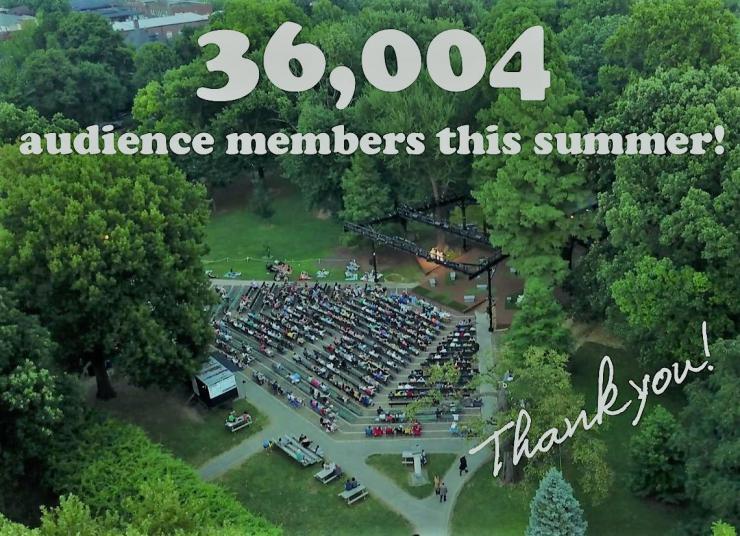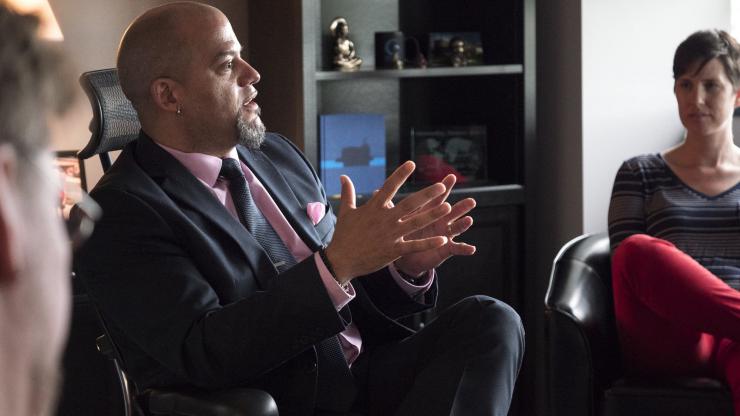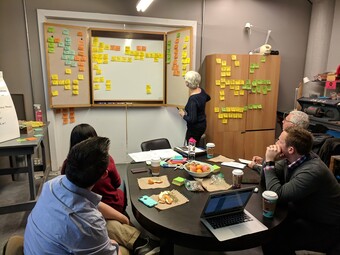Building Better Theatres
Success and Debriefs in America
One of my all-time favorite questions to ask in a job interview is, “How do you evaluate success, and can you describe a situation where you feel like you really succeeded?” The answers are wildly disparate and run the gamut from happily quantified box office totals to a grimace quickly flashed before a long story that ends with, “...but we opened, so we made it.” The metrics for success for theatre artists change from show to show. Almost every theatre has productions that it celebrates because they are artistically challenging, as well as holiday plays or big musicals that really need to sell well to meet financial goals, and of course all artists are hoping for a creative process that combines collaboration, efficiency, and respect into a Neapolitan ice cream sundae of success. With those changing factors and multiple goal hoops hanging overhead, how do we start to know if a play has hit its marks? To know if a show has “succeeded,” a theatre has to have two things: 1) a definition of what success looks like (which may be different for every show); and 2) a candid process for talking about a show after the production is complete with its artists and audience.
Defining achievement for something as subjective as an artistic experience is tricky. The “success” of a theatre or of an individual show can hinge on a particular factor. At Kentucky Shakespeare, Associate Artistic Director Amy Attaway can immediately point to audience figures as a key marker for the free summer outdoor Shakespeare company. “[Attendance] is the biggest one, honestly, that’s the thing we’ve been talking about a ton,” Attaway explains, “Our mission is to bring the art to the people, so if people are coming to us in the park, we’ve succeeded.” Conversely, at an educational theatre like the one operated at Princeton University, Director and Senior Lecturer Jane Cox reports that ticket sales don’t matter and aren’t really used in any evaluation of a production. “The number one concern for me,” Cox says, “is that the students have an educational experience.”

Most theatres, however, have a multi-tiered understanding of achievement. At theatres like Trinity Repertory Company and the Guthrie Theater, parts of the missions of the theatres are to share stories with others, so in that way the box office is a tool for evaluating success, but achieving their artistic goals is a huge factor for them as well. At Trinity Rep, the staff looks at certain quantifiable markers such as ticket sales, including the effect of shows on season subscription renewals or attracting new subscribers, the number of students and classes that are exposed to the theatre, and audience surveys, which are sent to all patrons via email and contain graded and written answers about their experience. All of that is in addition to the work of Rebecca Noon, community engagement coordinator, which isn’t tied to financial numbers but is designed to impact the quality of relationships over seasons and years. According to David Stewart, director of production at the Guthrie Theater, it’s vital that the theatre is “telling the stories of our community and our city and our nation, and not just from a homogenous viewpoint,” in addition to selling tickets and attracting community partners. As ongoing initiatives such as the Ghostlight Project and ArtEquity emphasize the importance of equity, diversity, and inclusion efforts in the American theatre, part of how theatres succeed or fail will depend on their ability to be accessible, inclusive, and to set up creative teams and shows that celebrate the diversity of their communities. Accessibility is also something that Kentucky Shakespeare focuses on in their work, so they are presenting the stories of Shakespeare to the broadest range of their fellow citizens and in a way that people can understand and appreciate.
Theatres never know how successful they are until they have a definition for what that word means, even if that definition changes from show to show and season to season.
Working at an educational institution makes the investigation of a production’s purpose more important. Nonprofit theatres are created to produce shows. Universities are not. If the purpose of a university is to create mature and educated citizens, the university theatre is expected to have a substantial role in that effort. At Princeton, the students play a large role in choosing the season’s shows, so one of Cox’s goals is to develop undergraduates who are educated well enough to choose meaningful projects. In a similar way, many theatres have apprentice training programs or work with students, and those interns and apprentices bring with them a perspective that encourages theatres to push the envelope in their pursuit of artistic accomplishment. Part of the success of Kentucky Shakespeare’s season is based on the educational progress of their interns. There are end of season meetings held with each intern to help evaluate how their summer went and to get their insights on things that the theatre could do better. At Trinity Repertory Theatre, having the participation of Brown University’s MFA students changes the spirit of the institution, according to Noon. “Having close relationships to MFA students...there is this audience that comes into our space and is looking at our choices and our outcomes,” Noon reflects, “and they do affect our definition of ‘success’ in that way.” Theatres never know how successful they are until they have a definition for what that word means, even if that definition changes from show to show and season to season.
Before a production goes into development, theatres should share their expectations for putting on a “successful” show. As opposed to putting the highest value on artistic quality, Cox says that she tries to emphasize to guest artists up front that she cares about modeling “the process of collaboration and allow[ing] the students into the creative process,” and that she “care[s] very deeply that it’s a process where people are treated with respect.” Then, after the show has closed and Cox is engaging the team in follow up conversations, she can ask them questions about collaboration and respect without those conversations feeling pointed or capricious.
Being able to define success isn’t enough. People who work in theatre have to make a decision about how honest we can be with one another as we talk about our shows, and how much we care to hear. Dobrowsky at Trinity Rep applauds efforts that Trinity Rep has made to accumulate feedback. “The more ways that you can give people to express their feelings and thoughts, and don’t take them too personally,” Dobrowsky argues, “All that feedback is for the better.” The challenges of putting together a debrief meeting may be daunting; as Rebecca Noon points out, “The theatre can feel like such a conveyor belt of stuff—actors, projects—and getting people to reflect can feel so unproductive...but it’s a thing that people are craving.” Theatres may also not want to have a formal wrap up meeting because, “Finding the moment to sit down and converse with someone,” notes Attaway with understandable frustration, “is challenging.” A theatre is putting itself in a vulnerable position by having a wrap up meeting where criticisms may dominate the conversation, but it’s also giving itself a chance to grow. At Princeton, “[Wrap up meetings have] yielded really useful information, I mean really useful information...the same issues have come up repeatedly, and that’s made it clear what our weak areas are….it’s not anecdotal anymore, almost 85–90 percent of the people I talk to, both the students and the visitors, name the same weak links.”
Reflecting on shows can help theatres grow beyond the artistic and production areas. There is virtue in having a time for administrative departments to talk to artists and ask questions about the success of events and strategies used to sell the shows and reach out to the communities around specific productions. Theatres that are feeling siloed and divided into assembly lines might break their isolation by scheduling an extra half hour meeting for the administrative departments to talk to the cast about how the donor meet and greet went, or whether or not a community conversation was set up in the best possible way for the artists and audiences involved. Concerns raised about debrief meetings often focus on the plethora of fair (and unfair) criticism, but what if instead theatres think of these meetings as ways for artists and staff to celebrate what went right? Wrap ups and post mortems can be places where folks (many of whom do not share in a curtain call) congratulate each other on a show or event well done and take stock of the joys our work brings us.
Simply having a wrap up meeting, however, isn’t enough. Imagine that you are a young designer (or actor or director, etc.), and you’re opening a show at a theatre you have longed to work at for decades. You walk into the artistic director’s office for the first time ever after a week of late-night technical rehearsals, and the person who makes the decision about whether you ever work at that theatre again asks you, “So, what can we do better?” Are you thinking about the long road it took from the initial contracting process, or the weeks of design meetings, or the technical rehearsals? Or, are you thinking about how you can get out of this room without offending anyone or throwing up on the carpet? Are theatres creating an environment where they are earnestly looking to have candid and meaningful dialogue about their projects with their guest artists and audience members, and if so, are they doing it in a way that reduces intimidation and hassle?
Theatres are designed to develop real and meaningful relationships with its guest artists and communities; the act of coming together to watch these shows and have these experiences with each other should draw people in.
As I spoke to different people about this topic, what kept coming up time and time again was the value of relationships, not only in getting honest feedback but also for evaluating your theatre’s success. Theatres are designed to develop real and meaningful relationships with its guest artists and communities; the act of coming together to watch these shows and have these experiences with each other should draw people in. Once you have a personal and candid relationship with someone, their feedback becomes much more meaningful. Only if your artists are feeling comfortable and accepted by their organization can they approach a theatre with constructive criticism. Cox thinks of her debrief meetings as “an invitation for an ongoing relationship,” and adds that even if the meeting itself isn’t the most useful meeting in the world, “the act of asking and having the meeting is really meaningful to your creative teams.” David Stewart also sees the value in making his guests, “so incredibly comfortable in our space and in our relationship that they are like, ‘Yeah, you know what, I want to come back here and help make this work better.’” If the best feedback comes from stable and recurring relationships, having staff, designers, and actors work with you who are already a part of your local community can be a great benefit. Attaway highlights the value of resident companies for relationship building, saying that she is constantly receiving feedback about Kentucky Shakespeare’s process from a “core of seasoned veterans,” which keeps their communication channel open. “The actors aren’t shy about telling us things as we go along,” she laughs, “because they already know us so well.” Companies which consistently use freelance artists should also recognize that it’s hard to have a relationship with an organization, but as Noon points out, “organizations are made up of people, and you can have relationships with people.”

Jane Cox, who in addition to her work at Princeton has been working as a professional lighting designer for nineteen years, was asked for feedback about a show process by a theatre for the first time seven years ago. For the first twelve years of her career she cannot recall being asked about her experience working at any theatre, though she remembers artistic directors at several other theatres who would have an overview and debrief meeting with their playwrights and directors. “One of the reasons I got frustrated working as a freelance designer...is that freelance artists are the creative team for the theatre that gets put onstage, but are rarely involved in the institution, which seems like a horrible mistake for the future of the theatre,” she argues, “Any conversation that can mitigate that is a good thing.” It does seem, however, that the number of debrief meetings or wrap up conversations is on the rise. According to an unscientific survey conducted by me through the Production Managers Forum, 81 performing arts organizations reported their practices regarding debrief and post mortem meetings. Of those 81 companies, including dance, opera, universities, and professional theatres, 38 percent (31) of the groups did not have any kind of debrief conversation, whereas 44 percent (36) organizations set up conversations after every show to talk about the process. The remaining 17 percent (14) companies said that they generally had post production conversations about multiple shows at once or would have them only in response to a particular issue or concern. Twelve percent (6) of the performing arts groups that hold debrief meetings reported including guest artists in those debrief meetings alongside their staff. Only one of the 81 companies reported having a debrief meeting conducted exclusively with guest artists. In the spirit of only receiving the things you ask for, only 7 percent (6) of the performing arts groups polled reported often receiving unsolicited feedback from their guest artists.
If a theatre knows what success means for it, and if there is a way for feedback about its work to be discussed openly and honestly, the potential for growth is incredible. “Becoming is always much more interesting than being,” Dobrowsky adds, thinking about how theatres shouldn’t be satisfied that they’ve done enough or have finished learning. Whatever form that follow-up entails, whether a theatre does debrief meetings, written surveys, one-on-one conversations, or something else, “There is a really big value in having the guest artist share their experience whether it’s positive or negative,” says Maize, “because I think in an institution of this size, people can feel lost and left out, so it’s really a mode of inclusion.” Talking about our shows’ successes and challenges, even when it’s hard to schedule or the topics make us uncomfortable or there are issues that aren’t easily resolved, lead us to solutions, eventually. It’s challenging to sit in those conversations and really listen, but theatres can all become better if we give ourselves the chance to learn from and talk to each other.









Comments
The article is just the start of the conversation—we want to know what you think about this subject, too! HowlRound is a space for knowledge-sharing, and we welcome spirited, thoughtful, and on-topic dialogue. Find our full comments policy here